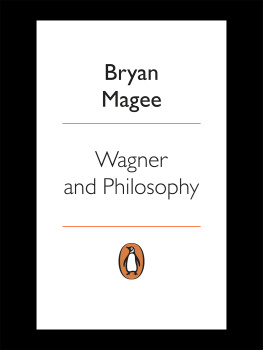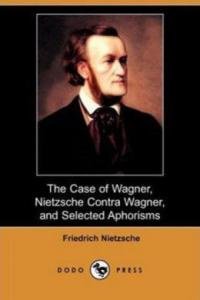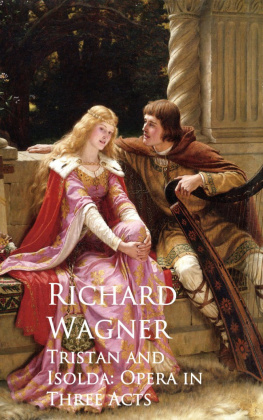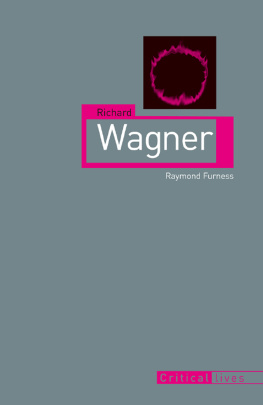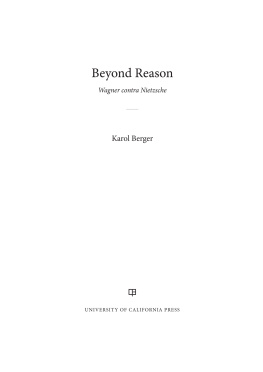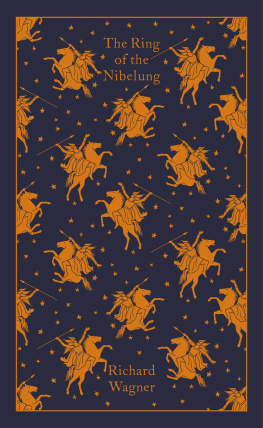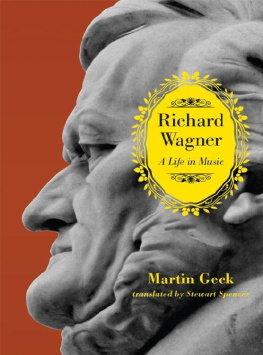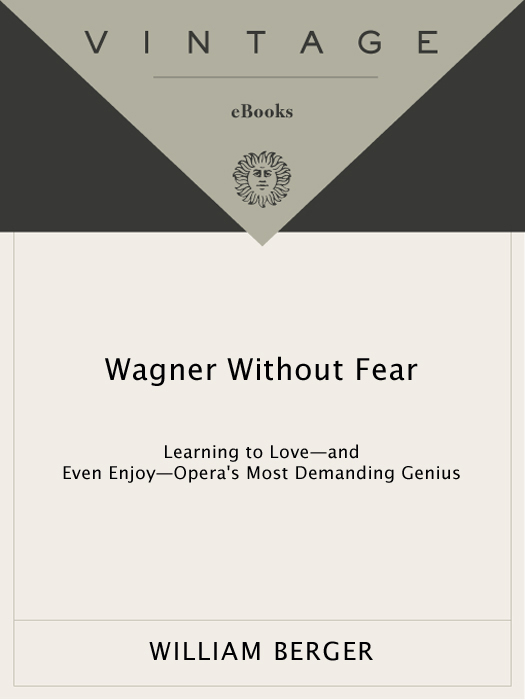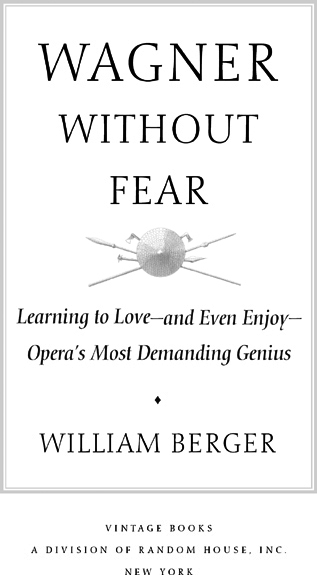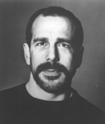
William Berger
WAGNER WITHOUT FEAR
William Berger was born in California and studied Romance languages and music at the University of California at Santa Cruz. He worked for five years at the San Francisco Opera Company, where he acquired for the companys recorded music collection and translated for visiting performers. He has taught language at Baruch College in New York City. He contributed to James Skofields libretto for The Dracula Diaries, an opera with music by Robert Moran, and has just completed the libretto for The Wolf of Gubbio, with the composer Patrick Barnes. Mr. Berger currently lives in New York and is at work on a performance piece, Karajans Wake.
To the memory of
Chris DeBlasio
(19591993),
whose solo reading of Das Rheingold at the pianoincluding all
vocal partsremains the best performance Ive ever attended
CONTENTS
PREFACE
This book has been brewing for years. I have always loved sharing my enthusiasm for opera in general and Wagner in particular with anyone who didnt run away fast enough.
The house where I grew up was musical in that records held pride of place, and Saturday mornings and afternoons were reserved for radio broadcasts from the Met. Opera was available, and my parents were only too happy to answer questions, but no one was forced to take music lessons, and Verdi and Wagner were right beside the Beatles and the Stones on the record shelf. You werent allowed to talk while music was playing, but discussion afterward was encouraged. Requests for records as presents were promptly and cheerfully granted. Other than this excellent environment, theres no particular reason why I should be devoted to this stuff. Im not a musicologist. I have no particular devotion to German culture. And I am from Los Angeles, which is not famous for its devotion to the classics.
Growing up in L.A. was actually an advantage in nurturing my love for the present subject. Although it was perceived as a cultural wasteland a generation ago (and not without reason), the do your own thing ethic was all-pervasive and even extended to such antisocial perversions as opera. The overall Zeitgeist among my peers was along the lines of Dude! This Brnnhilde babe is totally awesome, but can we listen to some rock now? Nor was my partiality to hard rock entirely separate in my mind from my budding interest in opera. I learned to appreciate intensity in music, that theres a difference between pure music and music as theater, that each genre of art comes with its own norms and clichs, and that there is endless pleasure in debating the meaning of obscure lyrics in difficult music. (This last bit of knowledge served me well in later years. Even considering the problems presented by the German language, the libretto of Tristan is simplicity itself compared to the lyrics of Led Zeppelin.) I was greatly aided by the absence of cultural traditions and institutions telling me that an appreciation for opera meant I was expected to cease associating with my cohorts and commence taking tea every afternoon at precisely four oclock. Some of my friends, amazed to discover that dragons and flying horses did not originate in early 1970s album cover art, asked questions, listened with me, and became fellow travelers down this unique road.
The moment of truth came when I was seventeen. For a variety of reasons, I found myself living in Vienna for a few months that winter. With nary a beach nor a palm tree to be found, I went to the Opera, which seemed like the only thing to do there. I knew some Wagner, but did not know Tristan beyond the Prelude and Liebestod, and my German was firmly in the mit Schlag, bitte stage. I could not even read the synopsis. I was, like the protagonists in Act I, at sea. Was this a problem? On the contraryI was blown away. The process of making it make sense had thrills of its own.
An incident that night confirmed my devotion. After the second act, a music student in standing room was deriding the performance at full voice to the shuffling audience. An elderly Viennese lady took exception to this critique and whacked him over the head with her tastefully beaded purse. A Soviet officer, attempting to restore decorum, made the mistake of laying hands on the lady, and a riot erupted: punches flew and socialites cast programs and debris from their boxes. The police arrived and within minutes all was forgotten among the heel-clicking and hand-kissing in the magnificent foyer.
I asked a stately lady for an explanation of what had occurred. After translating the students tirade and explaining the peoples lingering resentment at post-occupation Soviet officers in Austria, she added, You must understand the nature of Tristan und Isolde. It is a drug. It can open your eyes, ease your pain, even save your life. But if you keep indulging in it, it will make you insane. I was hooked.
And so it continued, in San Francisco, in Seattle, in Mexico City, in Berlin, but mostly in New York, where I learned that people have opinions. Sometimes I worked in the opera world, sometimes not, but thats where I went in the evenings no matter what, and thats where I found answers and antidotes to our strange world. For me, the information presented on the operatic stage is a combination of psychological handbook and scriptural revelation. Since I am constitutionally incapable of keeping exciting discoveries to myself, I have been apt to talk about this stuff a lot, and that eventually led to this book.
You see, I dont believe that opera, even Wagner, need be marginalized as a peculiar taste. One day, as I was writing this book, my Walkman died and I persuaded the excellent managers of the Gym at the Pines (Fire Island, N.Y.) to let me play Siegfried on their sound system. They were intrigued, but the gym emptied faster than the Mets matinee audience at intermission. That little experiment was not repeated, but I remain convinced that the Forging Song, with its relentless 9/8 beats, has a future in the discos. Nor is this to be filed under that heinous term crossover, since, as I see it, theres neither a there nor a here to be bridged. Opera, thank God, is a popular art form, available to anybody, with only a few pointers necessary.
Which is not to denigrate expertise. The research necessary even for a relentlessly nonacademic work like this is astounding, and I have been greatly helped by musicians, musicologists, opera people, and specialists in such varied fields as psychoanalysis and the German language. In addition to these experts, I must also thank the many friends and family who have contributed input and tolerated me for the last two years. Among these people, experts, opera lovers, and friends, I must name the following: First and foremost are Frances Berger of the Metropolitan Opera and Rich Lynn, the two most perfect Wagnerites I know. Others, listed alphabetically, are Marty Asher (of Vintage Books), Ramn Berger, Anthony Tirado Chase, Connie Coddington (Metropolitan Opera), Scott Curry (Hochschule fr Musik, Berlin), Ed De Bonis, Julie Doughty, Arthur Fox, Andr Gauthier (BMG Records), David Groff, Walter Havighurst, William Hoffmann, Audrey Kunstler, Dr. Lawrence Mass, Vinnie Maniscalco, Stephen J. Miller, Aronnora Morgan, Maya Nikolic (Writers House), Rose Rescigno, Anthony Roncalli, Esq., Lou Rufalo, Tina Ryker (Seattle Opera), Thom Saporita, Tom Spain, Judy Zecher (Metropolitan Opera), and Al Zuckerman (Writers House).


